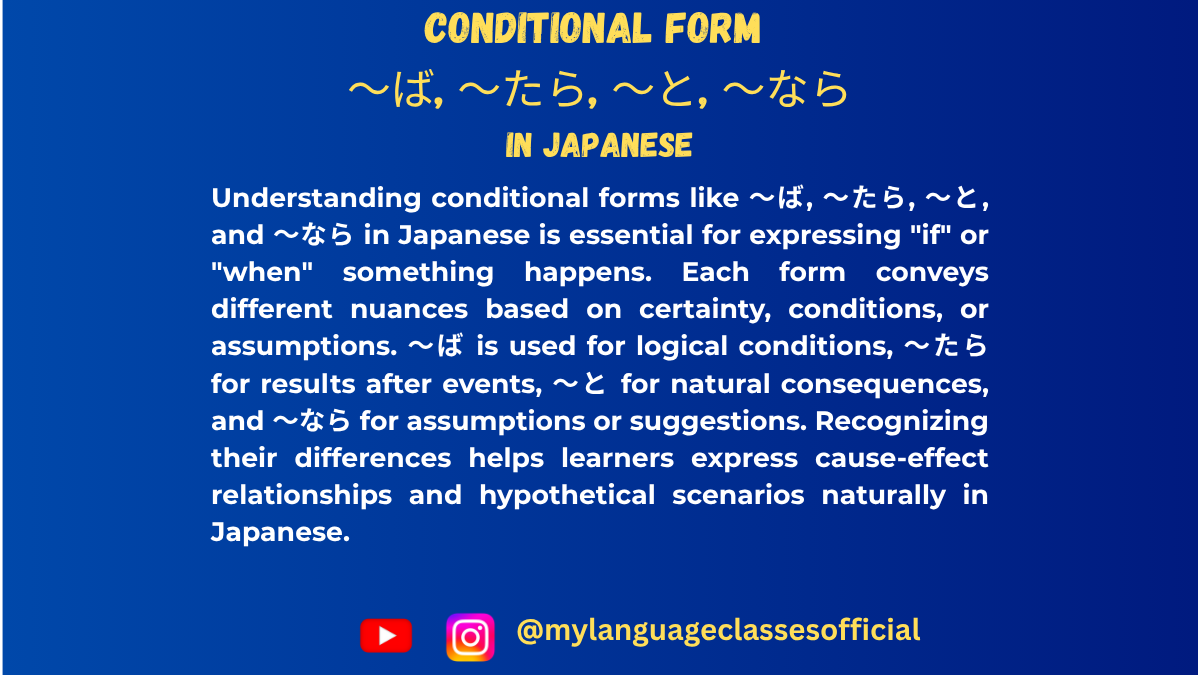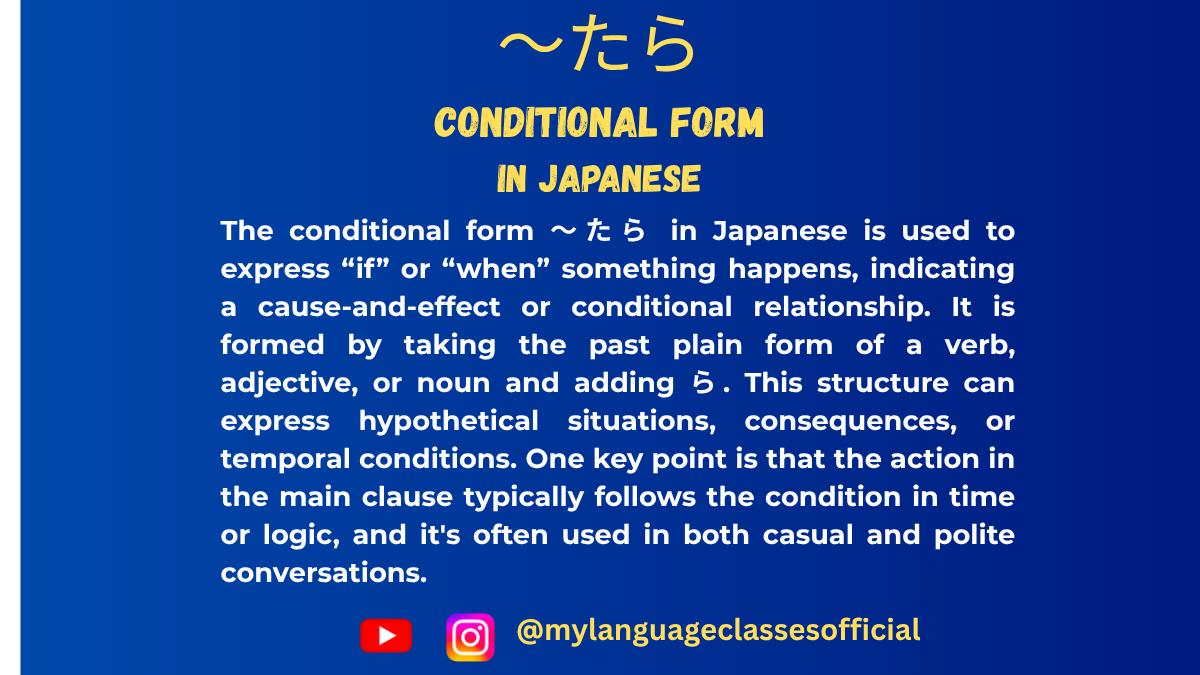Your cart is currently empty!
Tag: Japanese conditionals comparison
-

All Japanese Conditionals 〜ば, 〜たら, 〜と, 〜ならExplained | My Language Classes
Japanese Conditional Forms: 〜ば, 〜たら, 〜と, 〜なら Explained
In Japanese, conditional and hypothetical sentences are commonly expressed using four key grammatical structures: 〜ば, 〜たら, 〜と, and 〜なら. Each has unique nuances and appropriate usage contexts. In this article, we will explore each form, compare them, and provide a list of situations where they are used.
1. 〜ば (Ba-form)
Usage:
- Expresses general conditions and hypothetical situations.
- Often used in formal speech and writing.
- Cannot be used for past events.
- Cannot be used with volitional expressions (e.g., requests, invitations).
Formation:
Verb Type Formation Ichidan (る-verbs) Drop る + れば (e.g., 食べる → 食べれば) Godan (う-verbs) Change last う-row syllable to え-row + ば (e.g., 行く → 行けば) Adjectives (い-adj.) Drop い + ければ (e.g., 安い → 安ければ) Nouns/な-adjectives + ならば (e.g., 便利ならば) Examples:
- 早く行けば、電車に間に合いますよ。(If you go early, you will catch the train.)
- お金があれば、旅行したいです。(If I have money, I want to travel.)
- 静かであれば、勉強しやすいです。(If it is quiet, it is easy to study.)
2. 〜たら (Tara-form)
Usage:
- Used for general conditions, past conditions, and hypothetical situations.
- Can be used in past, present, or future contexts.
- Can be used with volitional expressions (e.g., requests, invitations).
Formation:
Word Type Formation Verbs (Past た-form + ら) 飲む → 飲んだら い-adjectives 楽しい → 楽しかったら な-adjectives / Nouns 簡単だ → 簡単だったら Examples:
- 雨が降ったら、家にいます。(If it rains, I will stay home.)
- お金があったら、旅行に行きたいです。(If I had money, I would travel.)
- 暇だったら、手伝ってください。(If you are free, please help.)
3. 〜と (To-form)
Usage:
- Expresses natural consequences, habitual results, and general truths.
- Does not express personal volition or future uncertainty.
- Common in proverbs and scientific facts.
Formation:
Word Type Formation Verbs (Dictionary form + と) 行く → 行くと い-adjectives 高い → 高いと な-adjectives / Nouns 便利だ → 便利だと Examples:
- 春になると、桜が咲きます。(When spring comes, cherry blossoms bloom.)
- このボタンを押すと、ドアが開きます。(If you press this button, the door will open.)
- 夜になると、気温が下がります。(When it becomes night, the temperature drops.)
4. 〜なら (Nara-form)
Usage:
- Used for assumptions, recommendations, and contextual conditions.
- Often used in conversations.
- Used when giving advice or referring to prior information.
Formation:
Word Type Formation Verbs (Dictionary form + なら) 行く → 行くなら い-adjectives 面白い → 面白いなら な-adjectives / Nouns 簡単だ → 簡単なら Examples:
- 日本に行くなら、京都を訪れるべきです。(If you go to Japan, you should visit Kyoto.)
- お金がないなら、アルバイトをしたほうがいい。(If you don’t have money, you should get a part-time job.)
- 映画を見るなら、ポップコーンを買いましょう。(If we’re watching a movie, let’s buy popcorn.)
5. Comparison Table: 〜ば vs. 〜たら vs. 〜と vs. 〜なら
Condition Type 〜ば 〜たら 〜と 〜なら General Conditions ✅ ✅ ✅ ✅ Hypothetical Situations ✅ ✅ ❌ ✅ Past Situations ❌ ✅ ❌ ✅ Natural Consequences ❌ ❌ ✅ ❌ Volitional Expressions ❌ ✅ ❌ ✅ Recommendations/Advice ❌ ❌ ❌ ✅
6. Situations Where They Are Used
Situation Example Best Form If it rains, I will stay home. 雨が降ったら、家にいます。 〜たら If you push this button, the door will open. このボタンを押すと、ドアが開きます。 〜と If I had money, I would travel. お金があれば、旅行したい。 〜ば If you are free, please help me. 暇だったら、手伝ってください。 〜たら If you go to Japan, you should visit Kyoto. 日本に行くなら、京都を訪れるべきです。 〜なら If you don’t study, you will fail the exam. 勉強しないと、試験に落ちる。 〜と
Conclusion
Each of these conditional forms—〜ば, 〜たら, 〜と, and 〜なら—has its specific nuances and contexts. By mastering these distinctions, learners can express conditional and hypothetical ideas naturally and accurately in Japanese. Understanding when to use each structure will significantly improve fluency and comprehension.
If you enjoyed this lesson, be sure to check out more posts like this on my blog at My Language Classes. Don’t forget to subscribe my YouTube channel and follow me on Instagram for the latest language learning tips and lessons. Leave a comment below to share your thoughts, or ask any questions you have about nouns.
Happy learning! 😊
-

Understanding 〜たら (If/When) | My Language Classes
Understanding the Conditional “If” or “When” in Japanese
Japanese is a beautifully nuanced language, and understanding its conditional expressions is essential to mastering its grammar. Among these, 〜たら is one of the most versatile and commonly used forms to express conditionality. While it often translates to “if” or “when” in English, its usage varies depending on context. In this blog post, we’ll dive into everything you need to know about 〜たら, including its formation, usage, and specific examples for different scenarios.
What is 〜たら?
The term 〜たら comes from the た-form of verbs, adjectives, or copulas, combined with the particle ら. This construction is used to describe a condition that must be met for the second clause to occur. Its meaning can vary depending on the time and certainty implied in the context.
Formation:
- Verbs:
Base verb (た-form) + ら
Example: 食べる (to eat) → 食べたら (if/when [you] eat) - Adjectives (い-adjectives):
Drop the い, add かった, then add ら.
Example: 楽しい (fun) → 楽しかったら (if/when [it’s] fun) - Adjectives (な-adjectives) & Nouns:
Add だったら after the base word.
Example: 静か (quiet) → 静かだったら (if/when [it’s] quiet)
学生 (student) → 学生だったら (if/when [you’re] a student)
When to Use 〜たら
〜たら is used in a variety of scenarios, and understanding the context is key to choosing the right conditional expression in Japanese. Below are the primary uses of 〜たら with examples.
1. Hypothetical Conditions (“If”)
When describing a situation that may or may not happen, 〜たら acts like “if” in English.
- Example:
雨が降ったら、家にいます。
(If it rains, I’ll stay home.)
2. Temporal Conditions (“When”)
〜たら can indicate “when” for an action that will happen after the condition is met.
- Example:
宿題が終わったら、遊びに行きましょう。
(When you finish your homework, let’s go play.)
3. Unrealistic or Imaginary Conditions
When discussing hypothetical scenarios that are unlikely or purely imaginary, 〜たら is the go-to form.
- Example:
お金持ちだったら、世界中を旅行したい。
(If I were rich, I would like to travel the world.)
4. Unexpected Results
In some cases, the action in the second clause is surprising or contrary to what was expected from the condition in the first clause.
- Example:
ドアを開けたら、猫がいました。
(When I opened the door, there was a cat.)
[Note: The speaker didn’t expect a cat to be there.]
5. Past Actions Followed by Realization
〜たら is also used when an action is completed, and the speaker realizes or learns something new afterward.
- Example:
その映画を見たら、泣いてしまった。
(When I watched that movie, I ended up crying.)
6. Conditional Advice or Suggestions
To offer advice or make suggestions contingent on a condition.
- Example:
疲れたら、休んだほうがいいですよ。
(If you’re tired, you should take a rest.)
List of Situations Where 〜たら is Used
Here’s a concise list of common situations where 〜たら appears:
- Hypothetical conditions: Speculating about what might happen.
- Temporal conditions: Actions that occur sequentially.
- Unrealistic conditions: Hypothetical scenarios (e.g., dreams or fantasies).
- Surprising or unexpected outcomes: Actions that yield unforeseen results.
- Post-event realization: Discoveries made after completing an action.
- Giving advice or suggestions: Contingent recommendations.
- Plans based on conditions: Situations where future actions depend on prior conditions.
How is 〜たら Different from Other Conditionals?
Japanese has several conditional forms, such as と, ば, and なら, which can sometimes overlap in meaning. Here’s how 〜たら compares:
- 〜たら is versatile and works for past, present, and future conditions, as well as hypothetical and temporal situations.
- と emphasizes natural consequences or inevitable results (e.g., “If you press this button, the door will open”).
- ば is more formal and focuses on hypothetical or logical outcomes.
- なら introduces a topic or focuses on conditions assumed to be true (e.g., “If it’s about Tokyo, I know a lot”).
Practice Makes Perfect!
To truly master 〜たら, practice creating sentences for various scenarios. Start with simple sentences like:
- 雨が降ったら、どうしますか?
(If it rains, what will you do?)
Then, challenge yourself with complex structures:
- この本を読んだら、新しい考え方が学べると思います。
(I think if you read this book, you’ll learn a new way of thinking.)
Conclusion
Understanding 〜たら is essential for fluency in Japanese. Its flexibility allows it to cover a range of situations, from hypothetical scenarios to real-life sequential actions. By practicing its usage and comparing it to other conditionals, you’ll be able to express yourself naturally and accurately in Japanese. Remember, context is everything, so keep practicing, and soon enough, using 〜たら will feel as natural as saying “if” or “when” in English!
If you enjoyed this lesson, be sure to check out more posts like this on my blog at My Language Classes. Don’t forget to subscribe my YouTube channel and follow me on Instagram for the latest language learning tips and lessons. Leave a comment below to share your thoughts, or ask any questions you have about nouns.
Happy learning! 😊
- Verbs:
